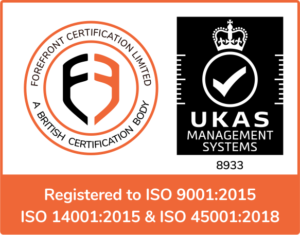Contact Us

Padel: How We Help Build It from the Ground Up
Padel, the fast-paced, accessible, and highly social racket sport has been taking the UK by storm. With its rising popularity demand for new padel courts and sports facilities is surging. From urban regeneration projects to community sports hubs or even back gardens, padel is becoming a central part of the nation’s evolving recreational landscape.
We recognise the opportunity that this growth presents – not only for sports development but also for sustainable construction. As ground investigation specialists, we provide essential early-stage support to developers, investors, and contractors looking to capitalise on the padel boom.
Why Ground Investigation Matters
Before construction begins, due diligence and planning is key to a successful project. Our role is to assess the suitability of a site for development, helping our clients understand risks associated with contamination, construction and cost. Early insight can be the difference between a profitable venture and costly surprises down the line.
Our comprehensive ground investigation services include:
- Detailed site investigation reports
- Soil and groundwater testing
- Waste classification
- Material management planning
Sustainable and Economical Solutions
Every padel court and sports facility needs a solid and safe foundation. We help design and deliver foundation and court solutions that are sustainable, cost-effective, and tailored to the site’s unique conditions. Our expertise helps reduce excess material waste and manage on-site resources efficiently – aligning with broader goals for sustainable construction.
Through Waste Classification and Material Management, we:
- Identify materials suitable for reuse or recycling on-site
- Minimise disposal costs and environmental impact
- Ensure full compliance with environmental and planning regulations
Supporting the Future of Sport
Padel is more than a trend – it’s becoming a permanent feature in the UK’s recreational landscape. Soiltechnics is proud to be part of that journey, offering specialist ground investigation and advisory services that help turn ambitious plans into successful, sustainable spaces.
If you’re planning to invest in or develop a padel court or sports centre, contact us today to find out how we can help you build from the ground up – the right way
In the fields of ground investigation, geotechnical engineering and geoenvironmental engineering, success often hinges on preparation. Before a single borehole is drilled or a soil sample is taken, a critical first step must be completed: the desk study. Often overlooked or undervalued, a well-executed desk study forms the foundation of any high-quality consultancy and is key to delivering value-driven, cost-effective, and safe engineering solutions.
What is a Desk Study?
A desk study, also known as a preliminary site assessment, Stage 1 or Phase 1 study, is an in-depth review of existing data and information about a site prior to physical ground investigation. This includes analysing:
- Geological maps and memoirs
- Historical land use and development records
- Environmental and contamination databases
- Aerial photographs and satellite imagery
- Previous site investigation reports
- Utility records
- Topographical and hydrological data
The objective is to develop a preliminary understanding of the site’s ground conditions, potential geohazards, contamination risks and historical context.
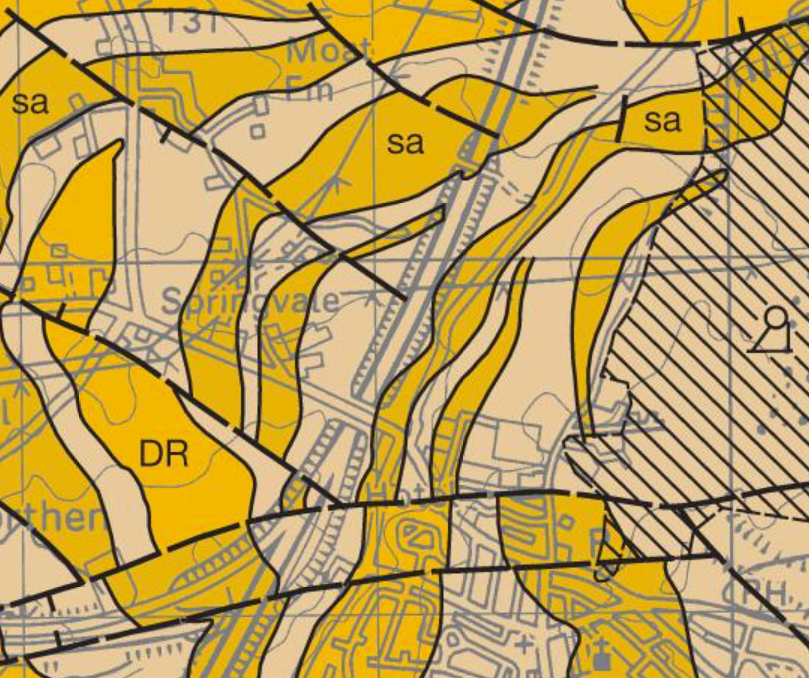
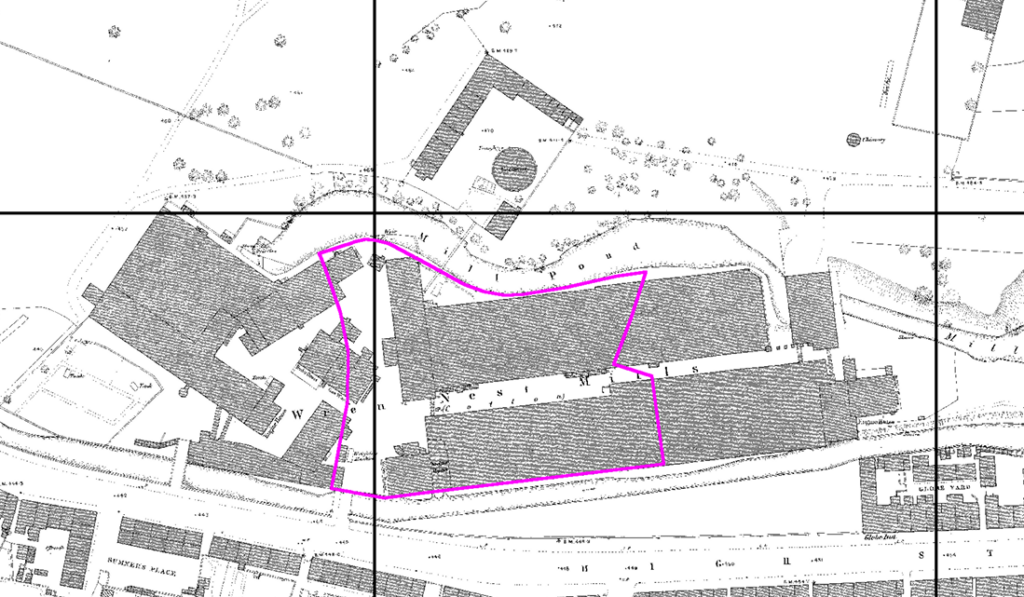
Why Desk Studies Matter
1. Informing and Optimizing the Site Investigation Plan
One of the core benefits of a desk study is its ability to guide and tailor the ground investigation strategy. By identifying areas of concern—such as potential Made Ground, historic landfills, or previous industrial use—the desk study allows geotechnical and geoenvironmental consultants to target their resources efficiently. This ensures that borehole locations, testing methods, and sampling strategies are chosen wisely, reducing unnecessary work and costs.
2. Reducing Risk and Enhancing Safety
Ground-related risks, including unstable ground, high groundwater tables, or the presence of contaminants, can have significant safety and financial implications. Early identification of these risks enables risk mitigation strategies to be embedded into both the investigation and design phases. This proactive approach not only protects project timelines and budgets but also enhances site safety for personnel and stakeholders.
3. Supporting Planning and Regulatory Compliance
Many planning authorities and environmental regulators require a Phase 1 desk study as part of planning submissions, particularly on brownfield or previously developed land. A robust desk study demonstrates due diligence and can streamline the approval process by addressing potential concerns before they escalate.
4. Providing Early-Stage Design Insights
Understanding anticipated ground conditions from the outset allows for the early evaluation of foundation options, ground improvement techniques, and construction feasibility. For example, if the desk study suggests deep Made Ground or soft Alluvium, piled foundations might be considered from day one, avoiding costly redesigns later in the project lifecycle.
5. Facilitating Collaboration and Communication
A comprehensive desk study also serves as a communication tool between project stakeholders—engineers, architects, planners, and clients. It helps ensure that everyone has a shared understanding of the site context, enabling more integrated and informed decision-making.
A Foundation for Value-Driven Consultancy
Ultimately, the desk study is not just a bureaucratic box to tick—it is a vital step that drives value throughout the ground investigation and geotechnical design process. By investing time and expertise in thorough preliminary research, geotechnical consultants can provide more accurate, efficient, and confident guidance from project inception to completion.
At Soiltechnics, we view desk studies as a strategic asset. Our experienced team combines technical knowledge with in-depth local and historical insight to deliver desk studies that add genuine value—reducing uncertainty, enhancing safety, and supporting smarter engineering outcomes.
As the UK continues its drive toward net zero by 2050, renewable energy projects rapidly expand, with solar farms leading the way.
Effective ground investigation and geotechnical support cannot be overstated when developing solar PV farms, especially as they often require innovative foundations and specialised risk assessments.
Soiltechnics is a leader in this field, offering a range of services designed to support every stage of solar farm development, from permitting to final site testing and verification.

Key Geotechnical Services for Solar Farms
Soiltechnics provides a comprehensive suite of services tailored to meet the specific needs of solar PV projects, ensuring safe, cost-effective, and sustainable development. Here are some of the core services offered:
- Permit Application Assistance – Soiltechnics streamlines the permitting process, assisting with the complex regulatory landscape so solar farm projects can proceed without unnecessary delays.
- Phase 1 & 2 Geotechnical & Geoenvironmental Site Appraisals – Soiltechnics specialises in in-depth site investigations, offering both Phase 1 and Phase 2 site appraisals that consider environmental factors and geotechnical suitability for solar projects. These site appraisals ensure the safe and sustainable use of land, even on previously disturbed or reclaimed sites.
- Pile Load Testing – Accurate pile load testing is critical for determining optimal pile types, site-specific conditions, and load capacities. Soiltechnics’ experienced team conducts rigorous pile load testing for solar PV farms, including testing for tension, compression, and lateral forces, allowing for informed decision-making on foundation requirements.
Want to learn how Soiltechnics can support your solar project? Contact us today to discuss how our tailored services can help drive your project to success.
Specialised Assessments for Unique Site Requirements

Earthworks and Material Management: Supporting Sustainable Solar Projects
Sustainable development is central to renewable energy, and Soiltechnics supports this through efficient earthwork planning and materials management.
- Earthworks Specification & Verification – From initial design to final verification, Soiltechnics’ geotechnical team supports earthworks for access roads, foundation platforms, and more. This service ensures that solar farms are built on a strong foundation that aligns with environmental and structural requirements.
- Materials Management Plans (MMPs) – Efficient waste management is crucial to maintaining project sustainability and profitability. Soiltechnics’ expertise in materials management planning helps minimise waste and maximise resource reuse, ultimately benefiting the project’s bottom line.
Why Choose Soiltechnics for Your Solar Farm Project?
With a proven track record and industry expertise, Soiltechnics is well-equipped to deliver specialised geotechnical services for solar farms across the UK and Europe.
Their holistic approach – from preliminary site assessments to advanced pile testing and risk assessments – ensures each project is developed on a solid foundation, both literally and figuratively.

Ready to optimise your solar farm project with expert geotechnical support? Get in touch with Soiltechnics to explore how our customised solutions can enhance your solar farm’s success.
Whether you need foundational risk assessments, trenchless crossing design, or complete site appraisals, our team is here to help.
Maximise the efficiency, safety, and sustainability of your solar farm project with Soiltechnics, your trusted partner in renewable energy development.
Adjacent to Kings Cross Station and in the vibrant Coal Drops Yard, construction has been in full swing since 2018, and it is exciting to see the UK Google HQ come to life. But the design, ground preparation and ground investigations commenced long before this.
The unique, 11-storey structure, with a triple-storey basement, designed by BIG and Heatherwick Studio comprises adaptable space, and required floors spanning the full width of the building, with internal multi-storey spaces.
The design included impressive triple-storey internal spaces, a column-free western elevation and a notable roof structure with trees. Accordingly, the loads were concentrated and significant.
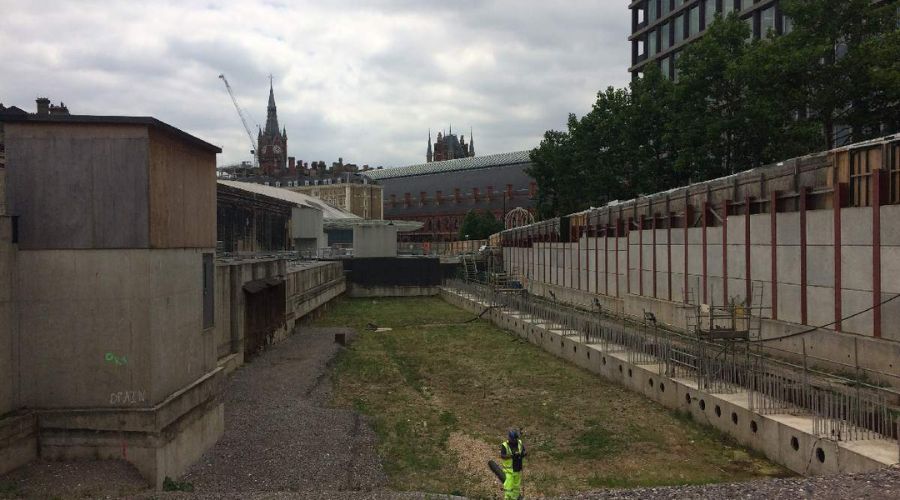
Challenges With Conventional Foundation Solutions
The conventional foundation solution would use piles terminating within the Thanet Sand Formation. However, this would require piles in excess of 40m long which would be timely and costly.
An alternative approach to investigation techniques and analysis was required, to ultimately limit construction risks.
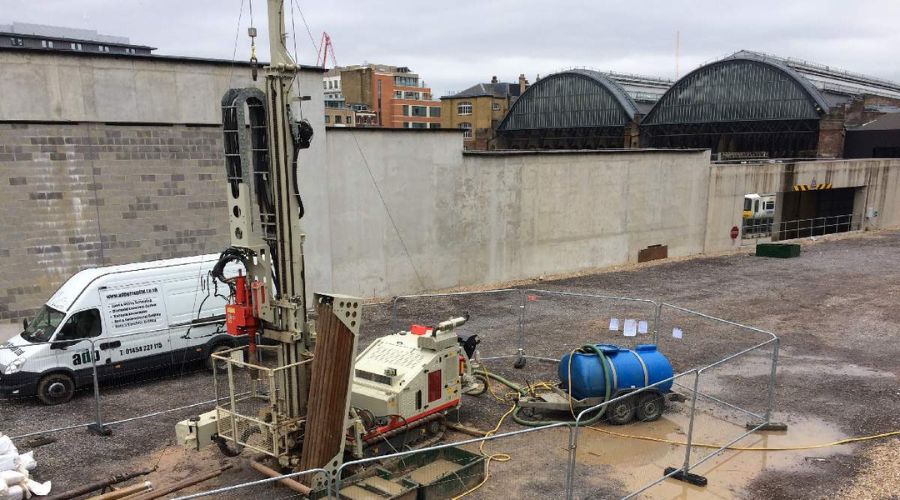
Pressuremeter Testing Approach
Working with structural engineers AKT II, along with the usual investigation data, the use of pressuremeter testing was advocated within the London Clay as it can provide high-quality data at small strain levels.
Despite the technique being around for decades it is used sparingly within the ground investigation industry. There is still a reliance on Standard Penetration Tests (SPTs) as they can provide multiple data points for a relatively low cost.
In contrast, the pressuremeter takes time and requires more borehole preparation, and there is a reluctance to place reliance on fewer data points for a seemingly higher cost.
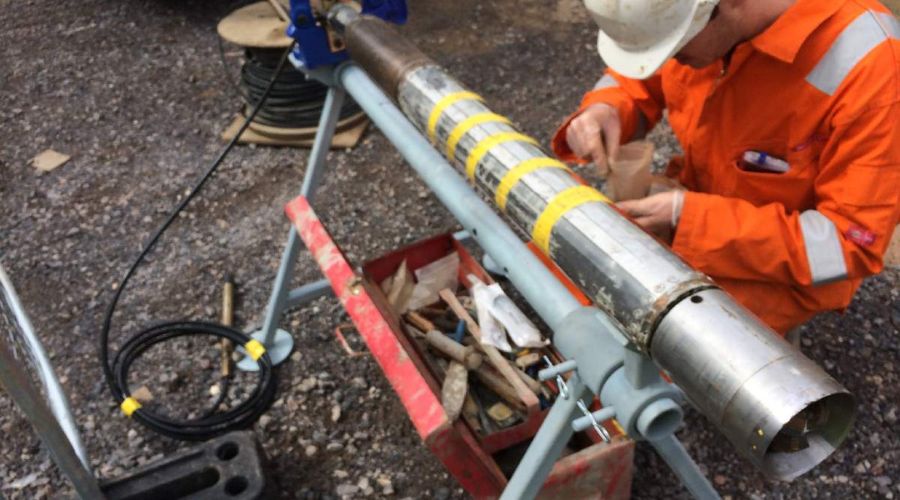
Pressuremeter Testing Benefits
The results from the pressuremeter testing indicated that the London Clay was significantly stronger than when estimated through SPTs and laboratory testing.
Accordingly, the foundation design could be leaner, achieving real cost savings and a reduction in concrete with associated carbon savings.
We continue to collaborate with our supply chain to provide innovative solutions. But sometimes it is simply a case of retrieving higher-quality data.
Of course, there is a cost and time implication but the overall benefit speaks volumes. Sometimes less really is more.
How We Can Help
At Soiltechnics, we can undertake a range of site-based testing.
Contact our team at +44(0) 1604 781877 or enquiries@soiltechnics.net today to find out how we can help and learn more about the services we provide.
Following our continued involvement in delivering ground investigations for The Football Foundation, we are thrilled to support them in 2024, delivering geotechnical consultancy and site investigation services on their new PlayZone framework across England. This adds to our current involvement with the Artificial Grass Pitch (AGP) framework, and we are delighted to continue to grow our long standing relationship.
The Football Foundation is a charitable organisation supporting the Premier League, The FA and Government to deliver outstanding grassroots sports facilities and transform local communities.
The new PlayZone scheme, has been set up to provide safe, inclusive, and accessible outdoor sports pitch facilities that bring communities together through recreational football and sport. Sites are targeted within communities with the greatest need to deliver new or refurbished spaces that enable priority groups to be more active.
Assessing potential ground risk at the sites is one of the first steps to determining viability of a PlayZone development. We initially assess each site through a desk-based approach, prior to carrying out intrusive site investigations. By critically assessing each site, we can recommend and carry out the most cost-effective method of investigation whilst still obtaining information sufficient to inform detailed design by the independent contractor. Accordingly, investigations can range from a few simple hand pits to deep boreholes.
Appropriate investigation is critical to allowing projects to be de-risked as far as possible in the early stages of design, allowing contractors to accurately tender construction works and deliver projects on time and on budget.


How We Can Help
At Soiltechnics, our expert geotechnical consultancy and site investigation services can help de-risk your project, ensuring timely and successful delivery.
Get in touch at enquiries@soiltechnics.net today to find out how we can support you.
Trenchless crossings allow the installation of critical infrastructure without causing disruption to existing roads and railways or environmental disturbance to rivers for example. Could you imagine excavating a trench across a motorway to install electricity cables?!
Trenchless crossing methods can be split broadly into two categories:
- Directional Drilling: Drilled from the surface on a downward arc trajectory to the surface on the other side of the obstacle being crossed.
- Microtunneling: In a horizontal line between two shafts or pits.
Support From Soiltechnics
Soiltechnics’ Geotechnical Consultancy team can offer support throughout the life of the project.
An initial phone call to discuss projects is normally enough for us to provide a high-level feasibility assessment and identify key ground-related constraints. We follow this with a detailed desk study and ground investigation to confirm conditions at the crossing location. Finally, we design the crossing profile.
From Aberdeen to Bognor Regis, we have supported the delivery of trenchless crossings, beneath a variety of critical infrastructure, including motorways, oil pipelines, railways and rivers.
Each project has a unique set of challenges, including shallow groundwater, UXO potential and blowing sands, to name a few.
Maintaining Safe Operations
As part of the design, we undertake a Ground Movement Assessment to estimate likely settlement beneath existing infrastructure (roads, rails, pipes) and where applicable a damage impact evaluation.

For directional drilling, we also model the potential for frac out during the drilling process.
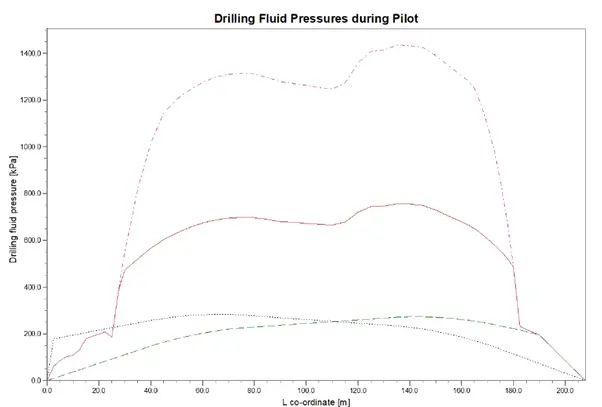
Working alongside the main contractor and providing technical design support, our team successfully delivered technical approval from governing bodies, including National Highways and Network Rail.
The support continues throughout construction by reviewing daily monitoring, which is typically required.
How We Can Help
At Soiltechnics, our team can help you navigate complex ground conditions to ensure your trenchless crossing project runs safely and smoothly.
Get in touch at enquiries@soiltechnics.net to discuss your trenchless crossing requirements in more detail and to learn more about the services we provide at Soiltechnics.
